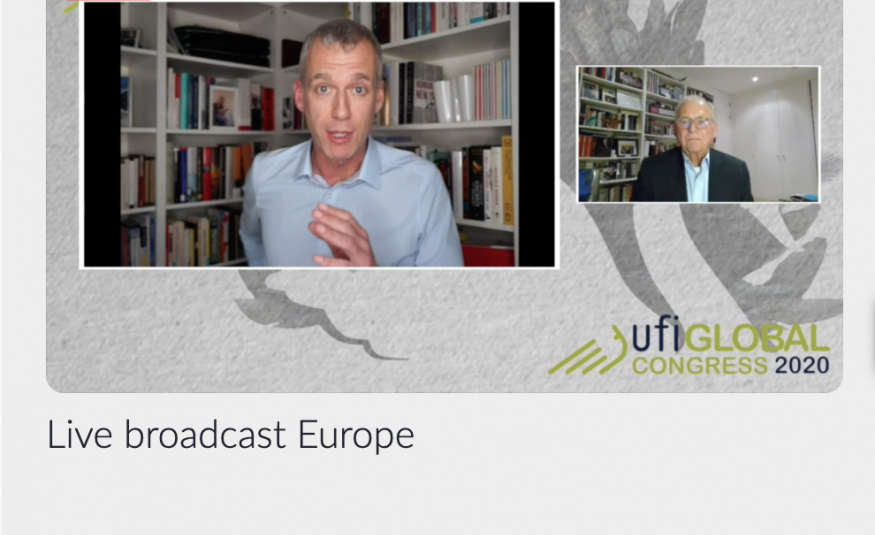Ambassador Wolfgang Ischinger fired up the delegates on Day 3 of the 87th UFI Global Congress, with some penetrating insights into geopolitics. “I cannot recall a moment in recent history when we had so many challenges simultaneously confronting the world at large,” he said, during a keynote interview with UFI MD and CEO Kai Hattendorf.
“The period we are living through is an era coming to an end, and the beginning of a new era that we don’t yet understand,” the Ambassador said, adding: “We have paid very little attention to how this pandemic will affect global stability.”
Ambassador Ischinger described Covid as a ‘polypandemic’ which had hit the whole world in five major areas:
- A Hunger pandemic: The number of people suffering from hunger will double
- A Poverty pandemic: 100 million additional people will fall into extreme poverty
- Authoritarianism pandemic: The number of authoritarian versus democratic countries is rising dramatically
- Inequality pandemic: For instance, there are many more doctors available in rich countries
- An international security pandemic: Failing states will produce more radicalisation – expect more terrorism, more migratory pressure.
Although we have been paying attention to how the pandemic has affected us on a personal level, Ambassador Ischinger said he thought we “paid very little attention to how this pandemic will affect global stability”.
He noted that with the ever closer union in Europe shot down by Brexit and China and Russia not being stakeholders in the Western model for international order, these were examples of many of the old certainties disappearing.
And he cautioned against a new US presidential panacea for our ills: “Let’s not get too euphoric, there will be no transatlantic paradise created by Joe Biden.”
Ambassador Ischinger added the worst mistake we could make “would be to sit back and think Joe Biden will make everything right…we have to bring something to the table… There must be an equitable process between US and Europe.”
He did, however, see a Biden administration in the US as “a great opportunity for the return of trust, truth, and transparency. It is a chance to reshape relationships again.”
Kai Hattendorf asked the Ambassador about burden sharing in the context of more global dissonances in recent years. “What are the main items we need to discuss as an international community to turn the tides towards more collaboration?” he asked.
“It is not possible to end pandemic in one country,” replied Ambassador Ischinger. “We need to return to a solid joint belief across the Atlantic in multilateral approaches.
“America first is fine, but should not mean you do not wish to work with partners and allies. A joint re-commitment to multilateralism is No.1 to create trust and help us re-establish the truth as our guiding principle.”
He also noted that on issues that divide, like energy and how to approach China, and arms control, acceptable compromises had to be worked out. And Ambassador Ischinger singled out China as the single biggest challenge to Transatlantic peace.
The Ambassador reminded the audience that he was also an event organiser (of the Munich Security Conference) and admitted facing big challenges, like others in the profession, in getting his conference on (in February). “We will probably organise a hybrid event. The volatility of our business and organising events is an enormous challenge. But there will be an event.”
Expanding on trust, and accessibility, and the role of events, Ambassador Ischinger said: “Closing borders was one of the most knee-jerk reactions by governments. This was wrong. We have learned that lesson.”
“Leaders will have an incentive to meet again physically. You can have any number of personal meetings at the margins of the [main] meeting. You can’t replace these personal physical meetings.
“We will find extremely interested audiences again soon, as soon as the authorities approve. Digital meetings serve a purpose, but are no real alternative,” he said noting: “It is not so easy to build a personal relationship on a laptop.”
The Ambassador ended on an optimistic note: “I see a revitalised business. I see a huge number of people desiring to flock to these gatherings. If you’ve been deprived of a decent dinner for weeks – you’ll be ready to pay extra for it.
“Let’s be optimistic. Things will work out. Meetings are essential.”
And asked by Kai Hattendorf to project the industry forward three years, Ambassador Ischinger added: “I expect [business events] to become fully alive again and pick up more speed.
“Let’s be optimistic things will work out. We will return to normal; albeit not the status quo, but a world where there is more virtual. But they will not replace real in-person events.”
The UFI digital-only 87th Global Congress continues. Still time to get involved: #FullProgramme for Day 3, click here: https://bit.ly/2Ufk4RI





